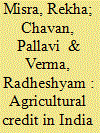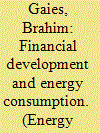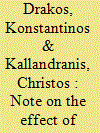|
|
|
Sort Order |
|
|
|
Items / Page
|
|
|
|
|
|
|
| Srl | Item |
| 1 |
ID:
144515


|
|
|
|
|
| Summary/Abstract |
The period of the 2000s witnessed a sharp revival in agricultural credit in India that was largely policy induced. There were emerging shifts in institutional, functional and regional distributions of agricultural credit during the decade. This study attempts to explore the relationship between agricultural credit and agricultural production/productivity. The state-level panel model attempted in this article suggests a positive impact of the intensity of agricultural credit on total factor productivity in agriculture. The impact was relatively stronger with respect to direct agricultural credit. A case study of the (combined) state of Andhra Pradesh also suggests a positive association between agricultural credit and agricultural production. The study lends credence to the policy approach of including agriculture, the largest employer in the Indian economy, as a sector for priority credit in India. It also highlights the point that the sector deserves continued policy support in order to move onto a sustainable and higher growth path.
|
|
|
|
|
|
|
|
|
|
|
|
|
|
|
|
| 2 |
ID:
169905


|
|
|
|
|
| Summary/Abstract |
This paper examines the relationship between financial development and energy consumption estimations in the major MENA countries (Algeria, Bahrain, Egypt, Iran, Iraq, Israel, Jordan, Kuwait, Lebanon, Libya, Morocco, Oman, Qatar, Saudi Arabia, Syria, Tunisia, United Arab Emirates and Yemen) over the period 1996 to 2014. We consider the energy use in kg of oil equivalent per capita as a dependent variable that reflects the cross-country energy consumption. We measure the level of financial development in the MENA countries by considering banking indicators. Extending the model of Sadorsky (2011), we estimate both linear and non-linear dynamic panel model. We use new robust econometrics to take into account heterogeneity and nonlinearity and we control the estimation results for the period of the global financial crisis. The results of the study report a positive and statistically significant relationship between the intermediation capacity of the banking system as well as its size and energy consumption. The findings also confirm a non-linear and inverted U-shaped relationship between financial development and energy demand for the MENA region. This implies that initially energy demand increases with financial development and then, at a turning point of financial development, it declines. The policy implications of these results are discussed.
|
|
|
|
|
|
|
|
|
|
|
|
|
|
|
|
| 3 |
ID:
150886


|
|
|
|
|
| Summary/Abstract |
The main focus of this paper is to estimate the effects of foreign direct investment (FDI) inflows, income and energy consumption on CO2 emissions using panel data of five ASEAN countries over 1981–2010. The results based on the pooled mean group (PMG) estimator of dynamic panels show that FDI tends to increase CO2 emissions, supporting evidence of the pollution haven hypothesis. We also find that income and energy consumption have a detrimental impact on reducing CO2 emissions.
|
|
|
|
|
|
|
|
|
|
|
|
|
|
|
|
| 4 |
ID:
140829


|
|
|
|
|
| Summary/Abstract |
This study documents that unforeseen events like terrorist attacks can be linked to the formation of Economic Sentiment after controlling for sentiment’s economic drivers. By utilizing dynamic panel techniques, the Economic Sentiment Indicator, as well as one of its constituents Consumer Sentiment, for a pan-European panel of 27 countries appear to be negatively influenced by terrorism activity. Moreover, these negative effects are significant only in the post-9/11 era.
|
|
|
|
|
|
|
|
|
|
|
|
|
|
|
|
| 5 |
ID:
140010


|
|
|
|
|
| Summary/Abstract |
This article provides an empirical analysis of the relationship between research and development (R&D) expenditures and economic growth, and determines whether this relationship differs with respect to the degree of development. In this regard, the study utilises data from 52 countries from 1996 to 2010 and employs a dynamic panel data model. The research finds that R&D expenditure has a positive and significant effect on economic growth for all countries in the long run, which is consistent with the relevant literature. For developing countries, the effect is weak in the short run but strong in the long run, as expected. The study adds new empirical evidence to the literature.
|
|
|
|
|
|
|
|
|
|
|
|
|
|
|
|
|
|
|
|
|